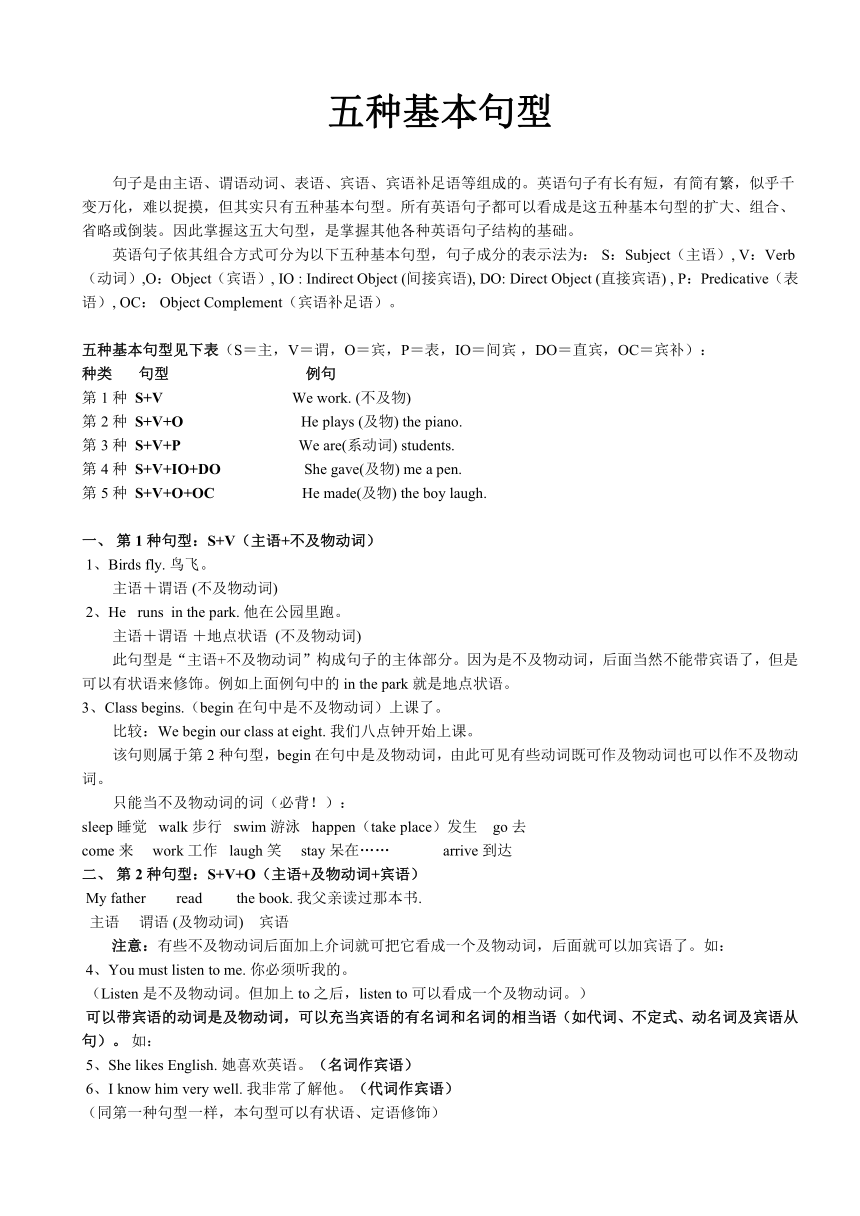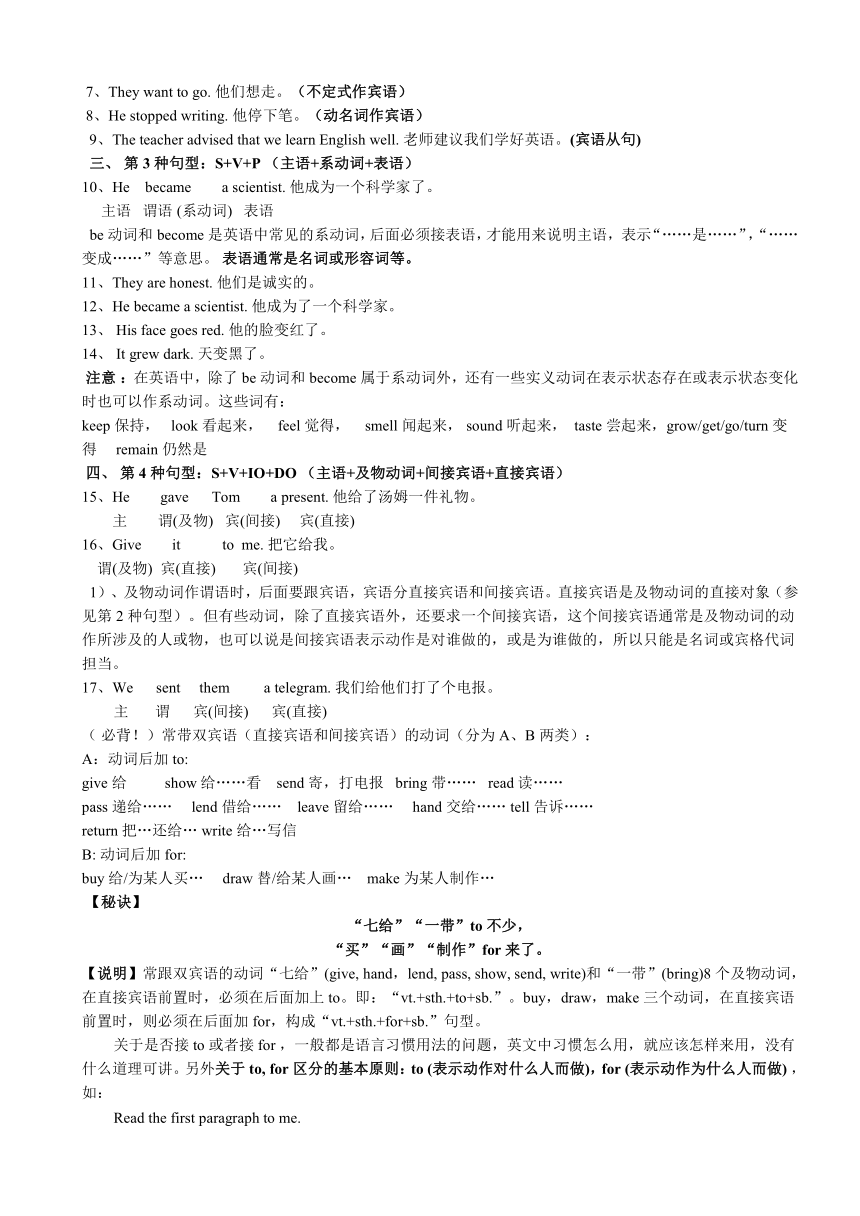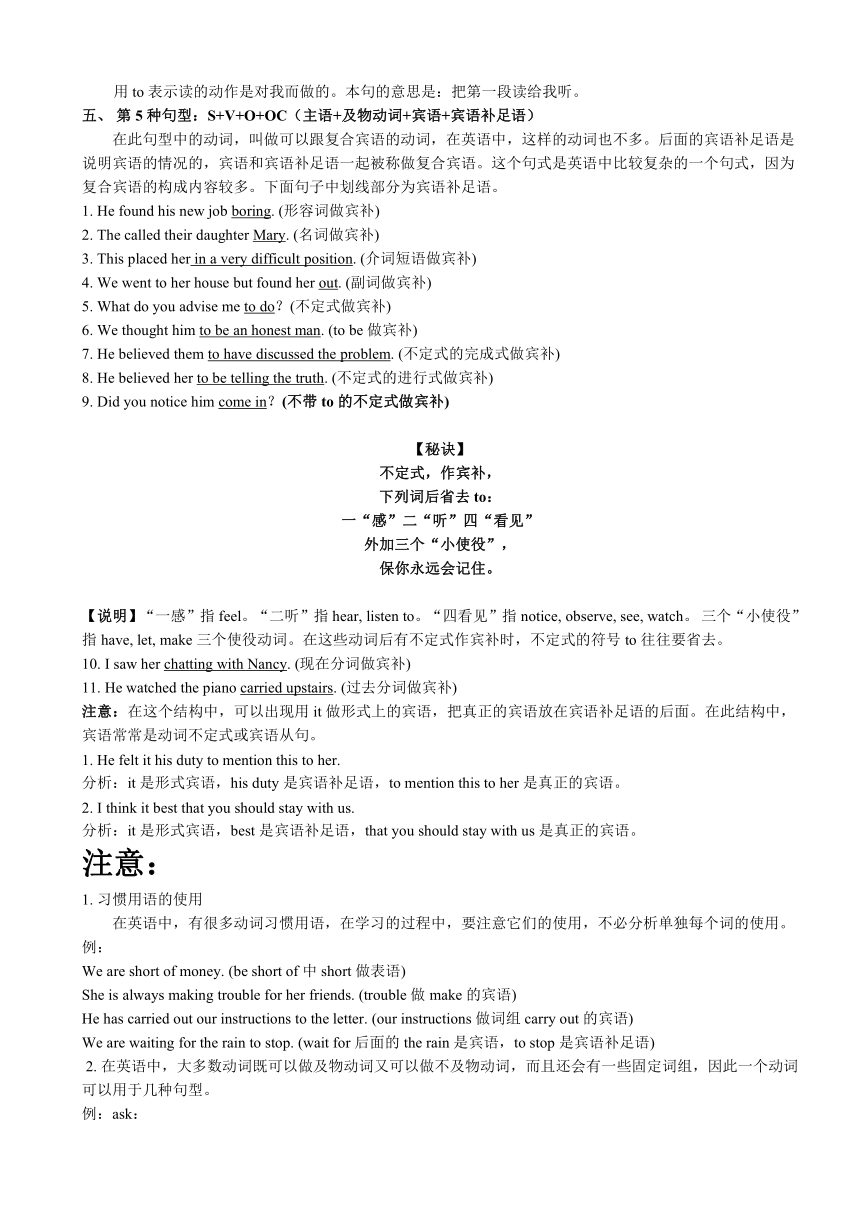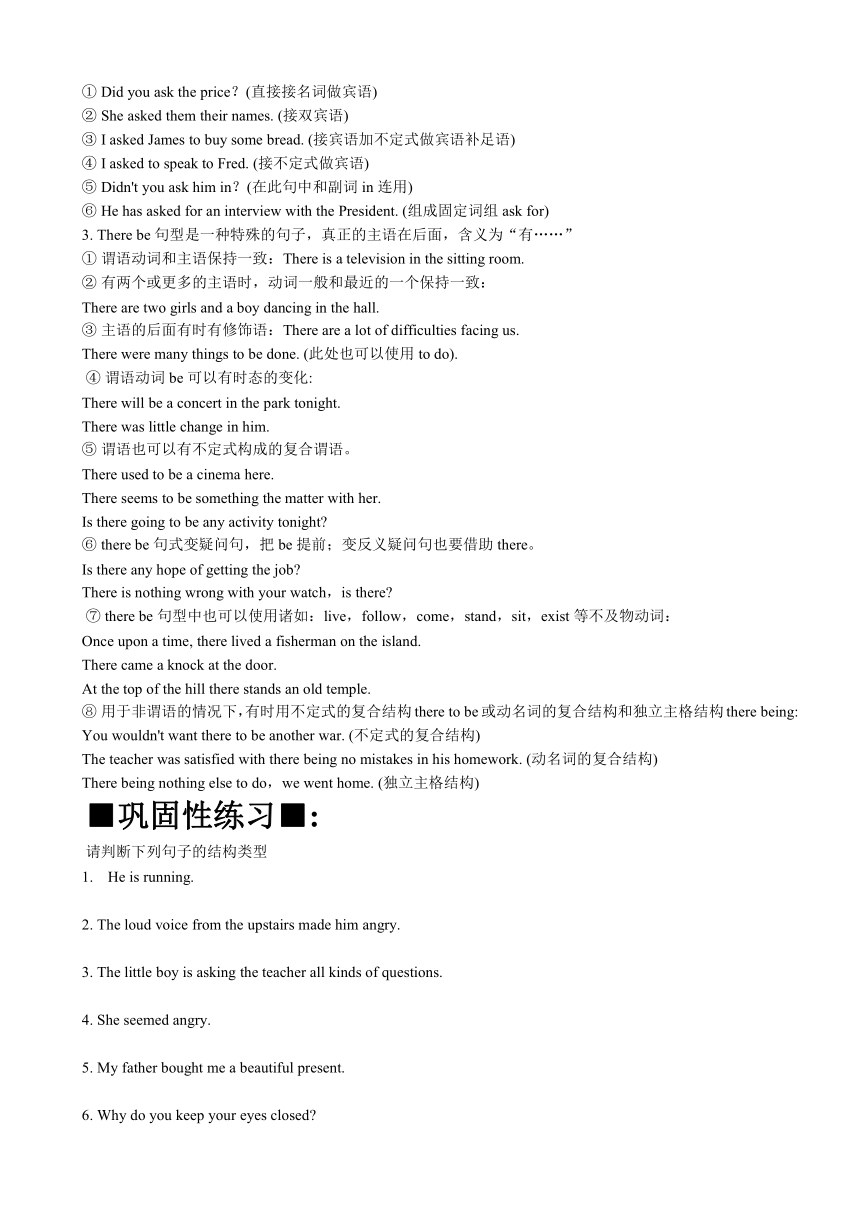高中英语 五种基本句型(含练习及答案)
图片预览




文档简介
五种基本句型
?
句子是由主语、谓语动词、表语、宾语、宾语补足语等组成的。英语句子有长有短,有简有繁,似乎千变万化,难以捉摸,但其实只有五种基本句型。所有英语句子都可以看成是这五种基本句型的扩大、组合、省略或倒装。因此掌握这五大句型,是掌握其他各种英语句子结构的基础。
英语句子依其组合方式可分为以下五种基本句型,句子成分的表示法为:?S:Subject(主语),
V:Verb(动词),O:Object(宾语),
IO
:
Indirect
Object
(间接宾语),
DO:
Direct
Object
(直接宾语)
,
P:Predicative(表语),
OC:?Object
Complement(宾语补足语)。
?
五种基本句型见下表(S=主,V=谓,O=宾,P=表,IO=间宾?,DO=直宾,OC=宾补):
种类???????句型????????????????????????????????????例句
第1种??S+V??????????????????????????????????We
work.
(不及物)
第2种??S+V+O????????????????????????????
?He
plays
(及物)
the
piano.
第3种??S+V+P???????????????????????????????We
are(系动词)
students.
第4种??S+V+IO+DO??????????????????????She
gave(及物)
me
a
pen.
第5种??S+V+O+OC???????????????????????He
made(及物)
the
boy
laugh.
?
一、?第1种句型:S+V(主语+不及物动词)
?1、Birds
fly.?鸟飞。
主语+谓语?(不及物动词)
?2、He???runs??in
the
park.?他在公园里跑。
主语+谓语?+地点状语??(不及物动词)?
此句型是“主语+不及物动词”构成句子的主体部分。因为是不及物动词,后面当然不能带宾语了,但是可以有状语来修饰。例如上面例句中的?in
the
park就是地点状语。
3、Class
begins.(begin在句中是不及物动词)上课了。
比较:We
begin
our
class
at
eight.?我们八点钟开始上课。
该句则属于第2种句型,begin在句中是及物动词,由此可见有些动词既可作及物动词也可以作不及物动词。?
只能当不及物动词的词(必背!):
sleep?睡觉???walk?步行???swim?游泳???happen(take
place)发生????go去
come来?????work?工作???laugh?笑?????stay呆在……??????????????arrive?到达?
二、?第2种句型:S+V+O(主语+及物动词+宾语)
?My
father????????read?????????the
book.?我父亲读过那本书.
??主语?????谓语?(及物动词)????宾语?
注意:有些不及物动词后面加上介词就可把它看成一个及物动词,后面就可以加宾语了。如:
?4、You
must
listen
to
me.?你必须听我的。
?(Listen是不及物动词。但加上to之后,listen
to可以看成一个及物动词。)
?可以带宾语的动词是及物动词,可以充当宾语的有名词和名词的相当语(如代词、不定式、动名词及宾语从句)。?如:
?5、She
likes?English.?她喜欢英语。(名词作宾语)
?6、I
know?him?very
well.?我非常了解他。(代词作宾语)
(同第一种句型一样,本句型可以有状语、定语修饰)
?7、They
want?to
go.?他们想走。(不定式作宾语)
?8、He
stopped?writing.?他停下笔。(动名词作宾语)
9、The
teacher
advised?that
we
learn
English
well.?老师建议我们学好英语。(宾语从句)
??三、?第3种句型:S+V+P?(主语+系动词+表语)
10、He????became????????a
scientist.?他成为一个科学家了。
?主语???谓语?(系动词)???表语
??be动词和become是英语中常见的系动词,后面必须接表语,才能用来说明主语,?表示“……是……”,“……变成……”等意思。?表语通常是名词或形容词等。
11、They
are?honest.?他们是诚实的。
12、He
became?a
scientist.?他成为了一个科学家。
13、?His
face
goes?red.?他的脸变红了。
14、?It
grew?dark.?天变黑了。
?注意?:在英语中,除了be动词和become属于系动词外,还有一些实义动词在表示状态存在或表示状态变化时也可以作系动词。这些词有:
keep保持,???look看起来,????feel觉得,????smell?闻起来,?sound?听起来,??taste?尝起来,grow/get/go/turn?变得?????remain?仍然是
?四、?第4种句型:S+V+IO+DO?(主语+及物动词+间接宾语+直接宾语)
15、He????????gave??????Tom????????a
present.?他给了汤姆一件礼物。
主????????谓(及物)???宾(间接)?????宾(直接)
16、Give????????it???????????to??me.?把它给我。
????谓(及物)??宾(直接)???????宾(间接)
??1)、及物动词作谓语时,后面要跟宾语,宾语分直接宾语和间接宾语。直接宾语是及物动词的直接对象(参见第2种句型)。但有些动词,除了直接宾语外,还要求一个间接宾语,这个间接宾语通常是及物动词的动作所涉及的人或物,也可以说是间接宾语表示动作是对谁做的,或是为谁做的,所以只能是名词或宾格代词担当。
17、We??????sent?????them?????????a
telegram.?我们给他们打了个电报。
主???????谓??????宾(间接)??????宾(直接)?
(?必背!)常带双宾语(直接宾语和间接宾语)的动词(分为A、B两类):
A:动词后加to:
give?给??????????show给……看????send寄,打电报???bring带……???read读……
pass递给……?????lend借给……????leave留给……?????hand交给……?tell告诉……
return把…还给…?write给…写信
B:?动词后加for:
buy给/为某人买…?????draw?替/给某人画…????make?为某人制作…
?【秘诀】
“七给”“一带”to不少,
“买”“画”“制作”for来了。
【说明】常跟双宾语的动词“七给”(give,
hand,lend,
pass,
show,
send,
write)和“一带”(bring)8个及物动词,在直接宾语前置时,必须在后面加上to。即:“vt.+sth.+to+sb.”。buy,draw,make三个动词,在直接宾语前置时,则必须在后面加for,构成“vt.+sth.+for+sb.”句型。
关于是否接to?或者接for?,一般都是语言习惯用法的问题,英文中习惯怎么用,就应该怎样来用,没有什么道理可讲。?另外关于to,
for?区分的基本原则:?to
(表示动作对什么人而做),?for
(表示动作为什么人而做)?,如:
Read
the
first
paragraph
to
me.
用to表示读的动作是对我而做的。本句的意思是:把第一段读给我听。
五、?第5种句型:S+V+O+OC(主语+及物动词+宾语+宾语补足语)
在此句型中的动词,叫做可以跟复合宾语的动词,在英语中,这样的动词也不多。后面的宾语补足语是说明宾语的情况的,宾语和宾语补足语一起被称做复合宾语。这个句式是英语中比较复杂的一个句式,因为复合宾语的构成内容较多。下面句子中划线部分为宾语补足语。
1.
He
found
his
new
job?boring.
(形容词做宾补)?
2.
The
called
their
daughter?Mary.
(名词做宾补)?
3.
This
placed
her?in
a
very
difficult
position.
(介词短语做宾补)?
4.
We
went
to
her
house
but
found
her?out.
(副词做宾补)?
5.
What
do
you
advise
me?to
do?(不定式做宾补)?
6.
We
thought
him?to
be
an
honest
man.
(to
be做宾补)?
7.
He
believed
them?to
have
discussed
the
problem.
(不定式的完成式做宾补)?
8.
He
believed
her?to
be
telling
the
truth.
(不定式的进行式做宾补)?
9.
Did
you?notice?him?come
in?(不带to的不定式做宾补)
?
【秘诀】
不定式,作宾补,
下列词后省去to:
一“感”二“听”四“看见”
外加三个“小使役”,
保你永远会记住。
?
【说明】“一感”指feel。“二听”指hear,
listen
to。“四看见”指notice,
observe,
see,
watch。?三个“小使役”指have,
let,
make三个使役动词。在这些动词后有不定式作宾补时,不定式的符号to往往要省去。?
10.
I
saw
her?chatting
with
Nancy.
(现在分词做宾补)?
11.
He
watched
the
piano?carried
upstairs.
(过去分词做宾补)?
注意:在这个结构中,可以出现用it做形式上的宾语,把真正的宾语放在宾语补足语的后面。在此结构中,宾语常常是动词不定式或宾语从句。?
1.
He
felt
it
his
duty
to
mention
this
to
her.?
分析:it是形式宾语,his
duty是宾语补足语,to
mention
this
to
her是真正的宾语。?
2.
I
think
it
best
that
you
should
stay
with
us.?
分析:it是形式宾语,best是宾语补足语,that
you
should
stay
with
us是真正的宾语。
注意:?
1.?习惯用语的使用?
在英语中,有很多动词习惯用语,在学习的过程中,要注意它们的使用,不必分析单独每个词的使用。?
例:
We
are
short
of
money.
(be
short
of中short做表语)
She
is
always
making
trouble
for
her
friends.
(trouble做make的宾语)
He
has
carried
out
our
instructions
to
the
letter.
(our
instructions做词组carry
out的宾语)
We
are
waiting
for
the
rain
to
stop.
(wait
for后面的the
rain是宾语,to
stop是宾语补足语)
?2.?在英语中,大多数动词既可以做及物动词又可以做不及物动词,而且还会有一些固定词组,因此一个动词可以用于几种句型。?
例:ask:
①?Did
you
ask
the
price?(直接接名词做宾语)
②?She
asked
them
their
names.
(接双宾语)
③?I
asked
James
to
buy
some
bread.
(接宾语加不定式做宾语补足语)
④?I
asked
to
speak
to
Fred.
(接不定式做宾语)
⑤?Didn't
you
ask
him
in?(在此句中和副词in连用)
⑥?He
has
asked
for
an
interview
with
the
President.
(组成固定词组ask
for)?
3.
There
be句型是一种特殊的句子,真正的主语在后面,含义为“有……”
①?谓语动词和主语保持一致:There
is
a
television
in
the
sitting
room.?
②?有两个或更多的主语时,动词一般和最近的一个保持一致:
There
are
two
girls
and
a
boy
dancing
in
the
hall.?
③?主语的后面有时有修饰语:There
are
a
lot
of
difficulties
facing
us.
There
were
many
things
to
be
done.
(此处也可以使用to
do).
?④?谓语动词be可以有时态的变化:
There
will
be
a
concert
in
the
park
tonight.
There
was
little
change
in
him.?
⑤?谓语也可以有不定式构成的复合谓语。
There
used
to
be
a
cinema
here.
There
seems
to
be
something
the
matter
with
her.
Is
there
going
to
be
any
activity
tonight??
⑥?there
be句式变疑问句,把be提前;变反义疑问句也要借助there。
Is
there
any
hope
of
getting
the
job?
There
is
nothing
wrong
with
your
watch,is
there?
?⑦?there
be句型中也可以使用诸如:live,follow,come,stand,sit,exist等不及物动词:
Once
upon
a
time,
there
lived
a
fisherman
on
the
island.
There
came
a
knock
at
the
door.
At
the
top
of
the
hill
there
stands
an
old
temple.?
⑧?用于非谓语的情况下,有时用不定式的复合结构there
to
be或动名词的复合结构和独立主格结构there
being:
You
wouldn't
want
there
to
be
another
war.
(不定式的复合结构)
The
teacher
was
satisfied
with
there
being
no
mistakes
in
his
homework.
(动名词的复合结构)
There
being
nothing
else
to
do,we
went
home.
(独立主格结构)
?■巩固性练习■:
?请判断下列句子的结构类型?
1.
He
is
running.
?
2.
The
loud
voice
from
the
upstairs
made
him
angry.
?
3.
The
little
boy
is
asking
the
teacher
all
kinds
of
questions.
?
4.
She
seemed
angry.
?
5.
My
father
bought
me
a
beautiful
present.
?
6.
Why
do
you
keep
your
eyes
closed?
?
7.
Will
you
tell
us
an
exciting
story?
?
8.
We
must
keep
our
classroom
tidy
and
clean.
?
9.
I
heard
the
baby
crying
in
the
sitting
room.
?
10.
Can
you
push
the
window
open?
基本句型一:
主+系+表
1.
当时他看起来不高兴。
2.
我喜欢的运动是游泳和滑冰。
3.
我擅长英语。
4.
收到你的来信我很高兴。
5.
在公路对面有一栋新教学楼。
6.
图书馆里有各种各样的书籍、报纸和杂志。
7.
那是在2000年2月8日早上7:15.
8.
天变得越来越黑。
9.
这食物吃起来挺可口的。
10.
这故事听起来很有趣。
基本句型二:
主+谓(不及物动词)
1.
1984年至1990年我在光明小学学习。
2.
今天上午,我们在校门口会面然后一起去那里。
3.
时间很快过去了。
4.
这几年我们家乡发生了巨大的变化。
5.
小车没有停而是快速的开走了。
6.
在过去的10年间它的经济发展迅速。
7.
那个年轻人重重地摔倒在地。
8.
过去他早上习惯于早起。
基本句型三:
主+谓(及物)+宾
1.
去年在学校电脑竞赛中我获得了一等奖。
2.
在业余时间我喜欢听流行音乐和收集邮票。
3.几天前我和我兄弟骑自行车去看电影。
4.
我们也在校园内和周围种上了许多树。
5.
晚上时,我可以看电视新闻或看报纸。
6.
在回家的路上他把钱给丢了。
7.
昨晚大约九点的时候,我正在做作业。
8.
才艺展示(Talent
Show)将于6月18日在北京电视台举行。
9.
下午,我将带你们转转,看一看一些名胜。
10.
盼望能尽早见到你。
基本句型四:
主+谓(及物)+双宾(间宾+直宾)
1.
去年王老师教我们英语。
2.
明天我要给他写封信,告诉他这个好消息。
3.
他们给他提供了一份工作,但他拒绝了。
4.
在我14岁生日时,爸爸给我买了一辆新自行车。
5.
昨晚我花了两小时才完成作业。
6.
对不起,能问你一个问题吗?
基本句型五:
主+谓(及物)+复合宾语(宾+宾补)
1.
当时我看到那些孩子在河边玩。
2.
我们正在使我们的国家变得越来越美丽。
3.
当我到达教室时,我发现里边没有人。
4.
昨天下午在公交车上我的钱包让人给偷了。
5.
我注意到凯特整个早上都在图书馆里看书。
6.
父亲叫我给他带些报纸来。
基本句型翻译综合练习:
1.
那噪音太响,我无法继续学习。
2.
得知你9月份要来我很高兴。
3.
人们需要一个可以休息和玩乐的地方。
4.
当那个人在过马路时,小车撞了他。
5.
我已答应明天下午3:30到机场接他。
6.
听了我说的话,我的邻居向我道歉并马上把电视音量关小。
7.
他是一个很有学问的人我们都很欣赏他。
8.
在过去,人们主要通过写信、打公共电话来彼此保持联系。
9.
我宁愿呆在家里,因为我可以做我想做的,比如:读书、看电视、帮助父母做家务。
10.
我们应该把中国文化和历史介绍给外国人,以便他们能更多的了解中国。
11.
为了改善北京交通,政府应鼓励更多人使用公共交通或自行车。
12.
以我的观点来看,考试作弊是错的,因为它违反了学校规章。
13.
我们学生应该诚实,尽力通过努力学习而不是考试作弊来获得好成绩。
14.
有个老人静静地坐在附近的一个板凳上。
Key:
1
1.
He
looked
unhappy
at
that
time.
2.
My
favourite
sports
are
swimming
and
skating.
3.
I
am
very
good
at
English.
4.
I
was
so
pleased
to
hear
from
you.
5.
On
the
other
side
of
the
road
there
is
a
new
classroom/teaching
building.
6.
In
the
library
there
are
all
kinds
of
books,
newspapers
and
magazines.
7.
It
was
7:15
on
the
morning
of
February
8,
2000.
8.
It
is
getting
darker
and
darker.
9.
The
food
tastes
delicious.
10.
The
story
sounds
very
interesting.
Key:
2
1.
I
studied
in
Guangming
Primary
School
from
1984
to
1990.
2.
This
morning
we
met
at
the
school
gate
and
went
there
together.
3.
The
time
passed
quickly.
4.
Great
changes
have
taken
place
in
our
hometown
these
years.
5.
The
car
didn't
stop
but
drove
off
at
great
speed.
6.
Its
economy
has
developed
rapidly
in
the
past
ten
years.
7.
The
young
man
fell
down
on
the
ground
hard.
8.
He
used
to
get
up
early
in
the
morning.
Key:
3
1.
Last
year
I
won
first
prize
in
the
school
computer
competition.
2.
In
my
spare
time
I
enjoy
listening
to
popular
music
and
collecting
stamps.
3.
The
other
day
my
brother
and
I
went
to
the
cinema
by
bicycle.
4.
We
also
planted
a
lot
of
trees
in
and
around
the
school.
5.
In
the
evenings
I
can
watch
news
on
TV
or
read
newspapers.
6.
He
lost
the
money
on
his
way
home.
7.
About
9
o'clock
last
night,
I
was
doing
my
homework.
8.
Talent
Show
will
be
held
in
Beijing
Television
Station
on
July
18.
9.
In
the
afternoon,
I’ll
show
you
around
and
take
you
to
some
places
of
interest.
10.
I’m
looking
forward
to
meeting
you
soon.
Key:
4
1.
Mr
Wang
taught
us
English
last
year.
2.
Tomorrow
I’ll
write
him
a
letter
and
tell
him
the
good
news.
3.
They
offered
him
a
job,
but
he
turned
it
down.
4.
On
my
14th
birthday,
Father
bought
me
a
new
bike.
5.
It
took
me
two
hours
to
finish
my
homework
last
night.
6.
Excuse
me,
can
I
ask
you
a
question?
Key:
5
1.
I
saw
the
kids/children
playing
by
the
river
at
that
time.
2.
We
are
making
our
country
more
and
more
beautiful.
3.
When
I
got
to
the
classroom,
I
found
nobody
in.
4.
I
had
my
wallet
stolen
on
a
bus
yesterday
afternoon.
5.
I
noticed
Kate
reading
in
the
library
all
the
morning.
6.
Father
asked/got
me
to
bring
him
some
newspapers.
Key:
6
1.
The
noise
was
so
loud
that
I
couldn't
go
on
studying.
2.
I’m
so
glad
to
learn
that
you’re
coming
in
September.
3.
People
need
a
place
where
they
can
rest
and
enjoy
themselves.
4.
The
car
hit
the
man
while
he
was
crossing
the
road.
5.
I
have
promised
to
meet
him
at
the
airport
at
3:30
tomorrow
afternoon.
6.
After
hearing
what
I
said,
my
neighbor
apologized
to
me
and
turned
down
the
TV
immediately.
7.
He
is
such
a
learned
person
that
we
all
admire
hem
very
much.
8.
In
the
past,
people
kept
in
touch
with
each
other
mainly
by
writing
letters
or
using
the
public
telephone.
9.
I
prefer
to
stay
at
home,
for
I
can
do
what
I
like,
such
as
reading
books,
watching
TV,
and
helping
my
parents
with
the
housework.
10.
We
should
introduce
the
Chinese
culture
and
history
to
foreigners
so
that
they
may
know
China
better.
11.
To
improve
the
traffic
in
Beijing,
the
government
should
encourage
more
people
to
use
public
transport
and
bicycles.
12.
In
my
opinion,
it
is
wrong
to
cheat
in
examinations
because
it
breaks
the
rules
of
schools.
13.
We
students
should
be
honest
and
try
to
get
good
results
by
studying
hard
instead
of
cheating
in
examinations.
14.
There
was
an
old
man
sitting
quietly
on
a
bench
nearby.
?
句子是由主语、谓语动词、表语、宾语、宾语补足语等组成的。英语句子有长有短,有简有繁,似乎千变万化,难以捉摸,但其实只有五种基本句型。所有英语句子都可以看成是这五种基本句型的扩大、组合、省略或倒装。因此掌握这五大句型,是掌握其他各种英语句子结构的基础。
英语句子依其组合方式可分为以下五种基本句型,句子成分的表示法为:?S:Subject(主语),
V:Verb(动词),O:Object(宾语),
IO
:
Indirect
Object
(间接宾语),
DO:
Direct
Object
(直接宾语)
,
P:Predicative(表语),
OC:?Object
Complement(宾语补足语)。
?
五种基本句型见下表(S=主,V=谓,O=宾,P=表,IO=间宾?,DO=直宾,OC=宾补):
种类???????句型????????????????????????????????????例句
第1种??S+V??????????????????????????????????We
work.
(不及物)
第2种??S+V+O????????????????????????????
?He
plays
(及物)
the
piano.
第3种??S+V+P???????????????????????????????We
are(系动词)
students.
第4种??S+V+IO+DO??????????????????????She
gave(及物)
me
a
pen.
第5种??S+V+O+OC???????????????????????He
made(及物)
the
boy
laugh.
?
一、?第1种句型:S+V(主语+不及物动词)
?1、Birds
fly.?鸟飞。
主语+谓语?(不及物动词)
?2、He???runs??in
the
park.?他在公园里跑。
主语+谓语?+地点状语??(不及物动词)?
此句型是“主语+不及物动词”构成句子的主体部分。因为是不及物动词,后面当然不能带宾语了,但是可以有状语来修饰。例如上面例句中的?in
the
park就是地点状语。
3、Class
begins.(begin在句中是不及物动词)上课了。
比较:We
begin
our
class
at
eight.?我们八点钟开始上课。
该句则属于第2种句型,begin在句中是及物动词,由此可见有些动词既可作及物动词也可以作不及物动词。?
只能当不及物动词的词(必背!):
sleep?睡觉???walk?步行???swim?游泳???happen(take
place)发生????go去
come来?????work?工作???laugh?笑?????stay呆在……??????????????arrive?到达?
二、?第2种句型:S+V+O(主语+及物动词+宾语)
?My
father????????read?????????the
book.?我父亲读过那本书.
??主语?????谓语?(及物动词)????宾语?
注意:有些不及物动词后面加上介词就可把它看成一个及物动词,后面就可以加宾语了。如:
?4、You
must
listen
to
me.?你必须听我的。
?(Listen是不及物动词。但加上to之后,listen
to可以看成一个及物动词。)
?可以带宾语的动词是及物动词,可以充当宾语的有名词和名词的相当语(如代词、不定式、动名词及宾语从句)。?如:
?5、She
likes?English.?她喜欢英语。(名词作宾语)
?6、I
know?him?very
well.?我非常了解他。(代词作宾语)
(同第一种句型一样,本句型可以有状语、定语修饰)
?7、They
want?to
go.?他们想走。(不定式作宾语)
?8、He
stopped?writing.?他停下笔。(动名词作宾语)
9、The
teacher
advised?that
we
learn
English
well.?老师建议我们学好英语。(宾语从句)
??三、?第3种句型:S+V+P?(主语+系动词+表语)
10、He????became????????a
scientist.?他成为一个科学家了。
?主语???谓语?(系动词)???表语
??be动词和become是英语中常见的系动词,后面必须接表语,才能用来说明主语,?表示“……是……”,“……变成……”等意思。?表语通常是名词或形容词等。
11、They
are?honest.?他们是诚实的。
12、He
became?a
scientist.?他成为了一个科学家。
13、?His
face
goes?red.?他的脸变红了。
14、?It
grew?dark.?天变黑了。
?注意?:在英语中,除了be动词和become属于系动词外,还有一些实义动词在表示状态存在或表示状态变化时也可以作系动词。这些词有:
keep保持,???look看起来,????feel觉得,????smell?闻起来,?sound?听起来,??taste?尝起来,grow/get/go/turn?变得?????remain?仍然是
?四、?第4种句型:S+V+IO+DO?(主语+及物动词+间接宾语+直接宾语)
15、He????????gave??????Tom????????a
present.?他给了汤姆一件礼物。
主????????谓(及物)???宾(间接)?????宾(直接)
16、Give????????it???????????to??me.?把它给我。
????谓(及物)??宾(直接)???????宾(间接)
??1)、及物动词作谓语时,后面要跟宾语,宾语分直接宾语和间接宾语。直接宾语是及物动词的直接对象(参见第2种句型)。但有些动词,除了直接宾语外,还要求一个间接宾语,这个间接宾语通常是及物动词的动作所涉及的人或物,也可以说是间接宾语表示动作是对谁做的,或是为谁做的,所以只能是名词或宾格代词担当。
17、We??????sent?????them?????????a
telegram.?我们给他们打了个电报。
主???????谓??????宾(间接)??????宾(直接)?
(?必背!)常带双宾语(直接宾语和间接宾语)的动词(分为A、B两类):
A:动词后加to:
give?给??????????show给……看????send寄,打电报???bring带……???read读……
pass递给……?????lend借给……????leave留给……?????hand交给……?tell告诉……
return把…还给…?write给…写信
B:?动词后加for:
buy给/为某人买…?????draw?替/给某人画…????make?为某人制作…
?【秘诀】
“七给”“一带”to不少,
“买”“画”“制作”for来了。
【说明】常跟双宾语的动词“七给”(give,
hand,lend,
pass,
show,
send,
write)和“一带”(bring)8个及物动词,在直接宾语前置时,必须在后面加上to。即:“vt.+sth.+to+sb.”。buy,draw,make三个动词,在直接宾语前置时,则必须在后面加for,构成“vt.+sth.+for+sb.”句型。
关于是否接to?或者接for?,一般都是语言习惯用法的问题,英文中习惯怎么用,就应该怎样来用,没有什么道理可讲。?另外关于to,
for?区分的基本原则:?to
(表示动作对什么人而做),?for
(表示动作为什么人而做)?,如:
Read
the
first
paragraph
to
me.
用to表示读的动作是对我而做的。本句的意思是:把第一段读给我听。
五、?第5种句型:S+V+O+OC(主语+及物动词+宾语+宾语补足语)
在此句型中的动词,叫做可以跟复合宾语的动词,在英语中,这样的动词也不多。后面的宾语补足语是说明宾语的情况的,宾语和宾语补足语一起被称做复合宾语。这个句式是英语中比较复杂的一个句式,因为复合宾语的构成内容较多。下面句子中划线部分为宾语补足语。
1.
He
found
his
new
job?boring.
(形容词做宾补)?
2.
The
called
their
daughter?Mary.
(名词做宾补)?
3.
This
placed
her?in
a
very
difficult
position.
(介词短语做宾补)?
4.
We
went
to
her
house
but
found
her?out.
(副词做宾补)?
5.
What
do
you
advise
me?to
do?(不定式做宾补)?
6.
We
thought
him?to
be
an
honest
man.
(to
be做宾补)?
7.
He
believed
them?to
have
discussed
the
problem.
(不定式的完成式做宾补)?
8.
He
believed
her?to
be
telling
the
truth.
(不定式的进行式做宾补)?
9.
Did
you?notice?him?come
in?(不带to的不定式做宾补)
?
【秘诀】
不定式,作宾补,
下列词后省去to:
一“感”二“听”四“看见”
外加三个“小使役”,
保你永远会记住。
?
【说明】“一感”指feel。“二听”指hear,
listen
to。“四看见”指notice,
observe,
see,
watch。?三个“小使役”指have,
let,
make三个使役动词。在这些动词后有不定式作宾补时,不定式的符号to往往要省去。?
10.
I
saw
her?chatting
with
Nancy.
(现在分词做宾补)?
11.
He
watched
the
piano?carried
upstairs.
(过去分词做宾补)?
注意:在这个结构中,可以出现用it做形式上的宾语,把真正的宾语放在宾语补足语的后面。在此结构中,宾语常常是动词不定式或宾语从句。?
1.
He
felt
it
his
duty
to
mention
this
to
her.?
分析:it是形式宾语,his
duty是宾语补足语,to
mention
this
to
her是真正的宾语。?
2.
I
think
it
best
that
you
should
stay
with
us.?
分析:it是形式宾语,best是宾语补足语,that
you
should
stay
with
us是真正的宾语。
注意:?
1.?习惯用语的使用?
在英语中,有很多动词习惯用语,在学习的过程中,要注意它们的使用,不必分析单独每个词的使用。?
例:
We
are
short
of
money.
(be
short
of中short做表语)
She
is
always
making
trouble
for
her
friends.
(trouble做make的宾语)
He
has
carried
out
our
instructions
to
the
letter.
(our
instructions做词组carry
out的宾语)
We
are
waiting
for
the
rain
to
stop.
(wait
for后面的the
rain是宾语,to
stop是宾语补足语)
?2.?在英语中,大多数动词既可以做及物动词又可以做不及物动词,而且还会有一些固定词组,因此一个动词可以用于几种句型。?
例:ask:
①?Did
you
ask
the
price?(直接接名词做宾语)
②?She
asked
them
their
names.
(接双宾语)
③?I
asked
James
to
buy
some
bread.
(接宾语加不定式做宾语补足语)
④?I
asked
to
speak
to
Fred.
(接不定式做宾语)
⑤?Didn't
you
ask
him
in?(在此句中和副词in连用)
⑥?He
has
asked
for
an
interview
with
the
President.
(组成固定词组ask
for)?
3.
There
be句型是一种特殊的句子,真正的主语在后面,含义为“有……”
①?谓语动词和主语保持一致:There
is
a
television
in
the
sitting
room.?
②?有两个或更多的主语时,动词一般和最近的一个保持一致:
There
are
two
girls
and
a
boy
dancing
in
the
hall.?
③?主语的后面有时有修饰语:There
are
a
lot
of
difficulties
facing
us.
There
were
many
things
to
be
done.
(此处也可以使用to
do).
?④?谓语动词be可以有时态的变化:
There
will
be
a
concert
in
the
park
tonight.
There
was
little
change
in
him.?
⑤?谓语也可以有不定式构成的复合谓语。
There
used
to
be
a
cinema
here.
There
seems
to
be
something
the
matter
with
her.
Is
there
going
to
be
any
activity
tonight??
⑥?there
be句式变疑问句,把be提前;变反义疑问句也要借助there。
Is
there
any
hope
of
getting
the
job?
There
is
nothing
wrong
with
your
watch,is
there?
?⑦?there
be句型中也可以使用诸如:live,follow,come,stand,sit,exist等不及物动词:
Once
upon
a
time,
there
lived
a
fisherman
on
the
island.
There
came
a
knock
at
the
door.
At
the
top
of
the
hill
there
stands
an
old
temple.?
⑧?用于非谓语的情况下,有时用不定式的复合结构there
to
be或动名词的复合结构和独立主格结构there
being:
You
wouldn't
want
there
to
be
another
war.
(不定式的复合结构)
The
teacher
was
satisfied
with
there
being
no
mistakes
in
his
homework.
(动名词的复合结构)
There
being
nothing
else
to
do,we
went
home.
(独立主格结构)
?■巩固性练习■:
?请判断下列句子的结构类型?
1.
He
is
running.
?
2.
The
loud
voice
from
the
upstairs
made
him
angry.
?
3.
The
little
boy
is
asking
the
teacher
all
kinds
of
questions.
?
4.
She
seemed
angry.
?
5.
My
father
bought
me
a
beautiful
present.
?
6.
Why
do
you
keep
your
eyes
closed?
?
7.
Will
you
tell
us
an
exciting
story?
?
8.
We
must
keep
our
classroom
tidy
and
clean.
?
9.
I
heard
the
baby
crying
in
the
sitting
room.
?
10.
Can
you
push
the
window
open?
基本句型一:
主+系+表
1.
当时他看起来不高兴。
2.
我喜欢的运动是游泳和滑冰。
3.
我擅长英语。
4.
收到你的来信我很高兴。
5.
在公路对面有一栋新教学楼。
6.
图书馆里有各种各样的书籍、报纸和杂志。
7.
那是在2000年2月8日早上7:15.
8.
天变得越来越黑。
9.
这食物吃起来挺可口的。
10.
这故事听起来很有趣。
基本句型二:
主+谓(不及物动词)
1.
1984年至1990年我在光明小学学习。
2.
今天上午,我们在校门口会面然后一起去那里。
3.
时间很快过去了。
4.
这几年我们家乡发生了巨大的变化。
5.
小车没有停而是快速的开走了。
6.
在过去的10年间它的经济发展迅速。
7.
那个年轻人重重地摔倒在地。
8.
过去他早上习惯于早起。
基本句型三:
主+谓(及物)+宾
1.
去年在学校电脑竞赛中我获得了一等奖。
2.
在业余时间我喜欢听流行音乐和收集邮票。
3.几天前我和我兄弟骑自行车去看电影。
4.
我们也在校园内和周围种上了许多树。
5.
晚上时,我可以看电视新闻或看报纸。
6.
在回家的路上他把钱给丢了。
7.
昨晚大约九点的时候,我正在做作业。
8.
才艺展示(Talent
Show)将于6月18日在北京电视台举行。
9.
下午,我将带你们转转,看一看一些名胜。
10.
盼望能尽早见到你。
基本句型四:
主+谓(及物)+双宾(间宾+直宾)
1.
去年王老师教我们英语。
2.
明天我要给他写封信,告诉他这个好消息。
3.
他们给他提供了一份工作,但他拒绝了。
4.
在我14岁生日时,爸爸给我买了一辆新自行车。
5.
昨晚我花了两小时才完成作业。
6.
对不起,能问你一个问题吗?
基本句型五:
主+谓(及物)+复合宾语(宾+宾补)
1.
当时我看到那些孩子在河边玩。
2.
我们正在使我们的国家变得越来越美丽。
3.
当我到达教室时,我发现里边没有人。
4.
昨天下午在公交车上我的钱包让人给偷了。
5.
我注意到凯特整个早上都在图书馆里看书。
6.
父亲叫我给他带些报纸来。
基本句型翻译综合练习:
1.
那噪音太响,我无法继续学习。
2.
得知你9月份要来我很高兴。
3.
人们需要一个可以休息和玩乐的地方。
4.
当那个人在过马路时,小车撞了他。
5.
我已答应明天下午3:30到机场接他。
6.
听了我说的话,我的邻居向我道歉并马上把电视音量关小。
7.
他是一个很有学问的人我们都很欣赏他。
8.
在过去,人们主要通过写信、打公共电话来彼此保持联系。
9.
我宁愿呆在家里,因为我可以做我想做的,比如:读书、看电视、帮助父母做家务。
10.
我们应该把中国文化和历史介绍给外国人,以便他们能更多的了解中国。
11.
为了改善北京交通,政府应鼓励更多人使用公共交通或自行车。
12.
以我的观点来看,考试作弊是错的,因为它违反了学校规章。
13.
我们学生应该诚实,尽力通过努力学习而不是考试作弊来获得好成绩。
14.
有个老人静静地坐在附近的一个板凳上。
Key:
1
1.
He
looked
unhappy
at
that
time.
2.
My
favourite
sports
are
swimming
and
skating.
3.
I
am
very
good
at
English.
4.
I
was
so
pleased
to
hear
from
you.
5.
On
the
other
side
of
the
road
there
is
a
new
classroom/teaching
building.
6.
In
the
library
there
are
all
kinds
of
books,
newspapers
and
magazines.
7.
It
was
7:15
on
the
morning
of
February
8,
2000.
8.
It
is
getting
darker
and
darker.
9.
The
food
tastes
delicious.
10.
The
story
sounds
very
interesting.
Key:
2
1.
I
studied
in
Guangming
Primary
School
from
1984
to
1990.
2.
This
morning
we
met
at
the
school
gate
and
went
there
together.
3.
The
time
passed
quickly.
4.
Great
changes
have
taken
place
in
our
hometown
these
years.
5.
The
car
didn't
stop
but
drove
off
at
great
speed.
6.
Its
economy
has
developed
rapidly
in
the
past
ten
years.
7.
The
young
man
fell
down
on
the
ground
hard.
8.
He
used
to
get
up
early
in
the
morning.
Key:
3
1.
Last
year
I
won
first
prize
in
the
school
computer
competition.
2.
In
my
spare
time
I
enjoy
listening
to
popular
music
and
collecting
stamps.
3.
The
other
day
my
brother
and
I
went
to
the
cinema
by
bicycle.
4.
We
also
planted
a
lot
of
trees
in
and
around
the
school.
5.
In
the
evenings
I
can
watch
news
on
TV
or
read
newspapers.
6.
He
lost
the
money
on
his
way
home.
7.
About
9
o'clock
last
night,
I
was
doing
my
homework.
8.
Talent
Show
will
be
held
in
Beijing
Television
Station
on
July
18.
9.
In
the
afternoon,
I’ll
show
you
around
and
take
you
to
some
places
of
interest.
10.
I’m
looking
forward
to
meeting
you
soon.
Key:
4
1.
Mr
Wang
taught
us
English
last
year.
2.
Tomorrow
I’ll
write
him
a
letter
and
tell
him
the
good
news.
3.
They
offered
him
a
job,
but
he
turned
it
down.
4.
On
my
14th
birthday,
Father
bought
me
a
new
bike.
5.
It
took
me
two
hours
to
finish
my
homework
last
night.
6.
Excuse
me,
can
I
ask
you
a
question?
Key:
5
1.
I
saw
the
kids/children
playing
by
the
river
at
that
time.
2.
We
are
making
our
country
more
and
more
beautiful.
3.
When
I
got
to
the
classroom,
I
found
nobody
in.
4.
I
had
my
wallet
stolen
on
a
bus
yesterday
afternoon.
5.
I
noticed
Kate
reading
in
the
library
all
the
morning.
6.
Father
asked/got
me
to
bring
him
some
newspapers.
Key:
6
1.
The
noise
was
so
loud
that
I
couldn't
go
on
studying.
2.
I’m
so
glad
to
learn
that
you’re
coming
in
September.
3.
People
need
a
place
where
they
can
rest
and
enjoy
themselves.
4.
The
car
hit
the
man
while
he
was
crossing
the
road.
5.
I
have
promised
to
meet
him
at
the
airport
at
3:30
tomorrow
afternoon.
6.
After
hearing
what
I
said,
my
neighbor
apologized
to
me
and
turned
down
the
TV
immediately.
7.
He
is
such
a
learned
person
that
we
all
admire
hem
very
much.
8.
In
the
past,
people
kept
in
touch
with
each
other
mainly
by
writing
letters
or
using
the
public
telephone.
9.
I
prefer
to
stay
at
home,
for
I
can
do
what
I
like,
such
as
reading
books,
watching
TV,
and
helping
my
parents
with
the
housework.
10.
We
should
introduce
the
Chinese
culture
and
history
to
foreigners
so
that
they
may
know
China
better.
11.
To
improve
the
traffic
in
Beijing,
the
government
should
encourage
more
people
to
use
public
transport
and
bicycles.
12.
In
my
opinion,
it
is
wrong
to
cheat
in
examinations
because
it
breaks
the
rules
of
schools.
13.
We
students
should
be
honest
and
try
to
get
good
results
by
studying
hard
instead
of
cheating
in
examinations.
14.
There
was
an
old
man
sitting
quietly
on
a
bench
nearby.
